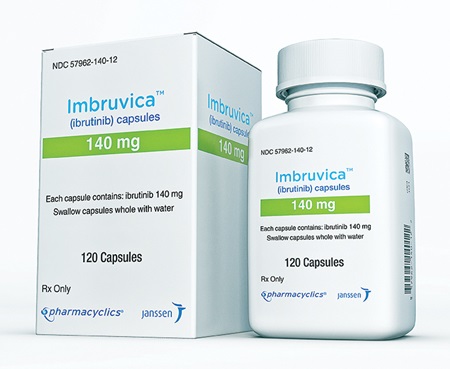Recently, AbbVie and J&J voluntarily deleted the indications for mantel cell lymphoma (MCL) and marginal zone lymphoma (MZL) of their first BTK inhibitor Imbruvica (ibrutinib), putting the break on their march to expanding applications.
However, according to officials at their Korean offshoots, the move will not affect the Korean market.
Last Thursday (local time), AbbVie and J&J announced their voluntary withdrawal of indications for Imbruvica to treat MCL patients who have received at least one or more treatments, and MZL patients who have received at least one or more anti-CD20-based treatments and require systemic therapy.

Imbruvica had received conditional approval for the two indications from the U.S. Food and Drug Administration based on the response rates in two phase 2 clinical trials.
The FDA approved on the condition that the companies prove clinical benefits in the SHINE study, a phase 3 confirmatory clinical trial for MCL patients, and the SELENE study, a phase 3 confirmatory clinical trial for MZL patients or relapsed/refractory follicular lymphoma (FL) patients.
However, the FDA judged these confirmatory clinical trials’ key results fell short of its shifting to official approval and notified the two companies of its conclusion.
In the SHINE study, a confirmatory clinical trial for the MCL indication, the drug fulfilled the primary endpoint by proving benefits in progression-free survival (PFS) in MCL patients with no previous treatments. Still, it failed to show a similar overall survival (OS) result. Besides, it turned out that adding Imbruvica to chemotherapies increased side effects compared to the placebo control group.
In the SELENE study, a confirmatory clinical trial for the MZL indication, the treatment failed to show PFS benefits in relapsed/refractory FL or MZL patients, remaining unable to reach the primary endpoint.
Notably, the companies meekly abandoned competing with the FDA, although there was room for additional discussion regarding the MCL indication.
That’s because Imbruvica has proven the effects of its monotherapy for secondary or more treatments through various clinical trial data it possessed.
The companies conducted the CAN3001 study, an open-label long-term follow-up research upon the expiry of three clinical trials (SPARK, RAY, and PCYC-1104 studies). As a result of following up and observing for up to seven-and-a-half years, a considerable number of patients treated with Imbruvica experienced complete remission (CR) for five years and more. Besides, the median value of the continuous response period of patients who reached CR with Imbruvica treatment exceeded five-and-a-half years.
Notably, among the three preceding studies, the RAY study also served as the basis for the domestic approval of Imbruvica for MCL patients.
RAY was a phase 3 clinical trial where researchers compared Imbruvica and temsirolimus in patients with relapsed/refractory MCL who have previously received one or more treatments. Imvrubica showed both PFS and OS benefits compared to the control group.
In August 2014, Janssen Korea received approval from the Ministry of Food and Drug Safety for Imbruvica monotherapy’s indication to treat MCL patients with one or more treatment experiences based on the RAY study’s result. In June 2016, it also began to receive insurance benefits for the pertinent treatment.
“The decision in the U.S. market exerts no influence on the approved indication in Korea,” Janssen Korea said.
The company made clear that it has no plans to change indications, explaining that the MCL indication it won from the Korean regulator was based on the RAY study that has nothing to do with the SHINE study, which recently stirred controversy in the U.S.
Accordingly, patients who receive insurance benefits in getting treatment with Imbruvica will likely continue their treatments, affected little by the U.S. development.
Aside from Imbruvica, two next-generation BTK inhibitors – Calquence (acalabrutinib) and Brukinsa (zanubrutinib) – have received approval from the ministry.
However, Calquence has no indication for MCL, and AstraZeneca has been delaying its launch since it won approval in February 2021.
Brukinsa, which jumped into the market most lately, has the indication for MCL like Imbruvica. However, it has not crossed the threshold of the cancer disease deliberation committee, the first gate toward insurance benefits, despite BeiGene’s repeated attempts.
Industry executives forecasted that Imbruvica’s dominance in MCL treatment would likely continue in Korea despite recent controversy over indications and the appearance of next-generation competitors.

